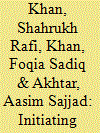|
|
|
Sort Order |
|
|
|
Items / Page
|
|
|
|
|
|
|
| Srl | Item |
| 1 |
ID:
137073


|
|
|
|
|
| Summary/Abstract |
This paper is a cautiously sympathetic treatment of conspiracy theory in Pakistan, relating it to Marxist theories of the state, structural functionalism and Machiavellian realism in international relations. Unlike moralising mainstream news reports describing terrorism in terms of horrific events and academic research endlessly lamenting the ‘failure’, ‘weakness’ and mendacity of the Pakistani state, conspiracy theory has much in common with realism in its cynical disregard for stated intentions and insistence on the primacy of inter-state rivalry. It contains a theory of the postcolonial state as part of a wider international system based on class-conspiracy, wedding imperial interests to those of an indigenous elite, with little concern for preserving liberal norms of statehood. Hence we consider some forms of conspiracy theory a layperson’s theory of the capitalist state, which seeks to explain history with reference to global and domestic material forces, interests and structures shaping outcomes, irrespective of political actors’ stated intentions. While this approach may be problematic in its disregard for intentionality and ideology, its suspicion of the notion that the ‘War on Terror’ should be read morally as a battle between states and ‘non-state actors’ is understandable – especially when technological and political-economic changes have made the importance of impersonal economic forces driving towards permanent war more relevant than ever.
|
|
|
|
|
|
|
|
|
|
|
|
|
|
|
|
| 2 |
ID:
100490


|
|
|
|
|
| Publication |
Karachi, Oxford University Press, 2007.
|
| Description |
xv, 273p.
|
| Standard Number |
9780195472219, hbk
|
|
|
|
|
|
|
|
|
|
|
|
Copies: C:1/I:0,R:0,Q:0
Circulation
| Accession# | Call# | Current Location | Status | Policy | Location |
| 055511 | 324.95491/KHA 055511 | Main | On Shelf | General | |
|
|
|
|
| 3 |
ID:
105059


|
|
|
|
|
| Publication |
2011.
|
| Summary/Abstract |
Of the rich academic literature that has emerged on the growth and dynamism of the "informal economy" in South Asia in recent years very little work has focused on the Pakistani context. This article builds upon the growing body of work on "informal employment" by identifying and explaining modes of labor control in the housing construction industry in metropolitan Pakistan. The crucial role of the subcontractor and his exploitative relationship with workers is discussed in a Gramscian framework. Workers are ensconced in a hegemonic relationship with contractors due to oppressive structural conditions as well as a culture of dependency that contractors have nurtured. Against the backdrop of the shift from Fordist to flexible accumulation regimes, the author argues that the present conjuncture is marked by the prevalence of extra-economic forms of control such that workers conceive of contractors as patrons. The instrumentalization of cultural norms of reciprocity by contractors does not mean that the labor-capital relationship is unchanging and rooted in "culture." In fact, personalized patronage networks coexist with impersonal market ethics dynamically so as to produce and sustain the hegemony of capital.
|
|
|
|
|
|
|
|
|
|
|
|
|
|
|
|
| 4 |
ID:
078518


|
|
|
|
|
| Publication |
2006.
|
| Summary/Abstract |
While the history of political Islam is intricately connected to southwest Asian geo-politics, there is evidence that the emergence of the religious right as a political force in Pakistan is an outcome of state patronage. Following the 'War on Terror', corporate media and official western representations of revivalist trends in Pakistan have been almost completely de-contextualised. This representation has provided both the dominant military state oligarchy and the religious right an ideal opportunity to reinforce an old alliance previously supported by western imperialism, while eroding the organising capacity of progressive social and political forces in Pakistan. This paper traces the historical contours of the mullah - military alliance in Pakistan, arguing that the political and social survival of both its armed forces and the religious right is based on the persistence of a dialectic relationship between a secular modernity and Islamic ethos that can be traced back to the country's creation. The evolution of this state ideology since Partition demonstrates how the religious right has emerged as a social and political force under state patronage. The paper examines how two critical junctures in this mullah - military alliance - namely, the Afghan jihad (struggle) of the 1980s and the post-9/11 War on Terror - have allowed the state and the religious right in Pakistan to overtly consolidate this historical alliance
|
|
|
|
|
|
|
|
|
|
|
|
|
|
|
|
|
|
|
|
|